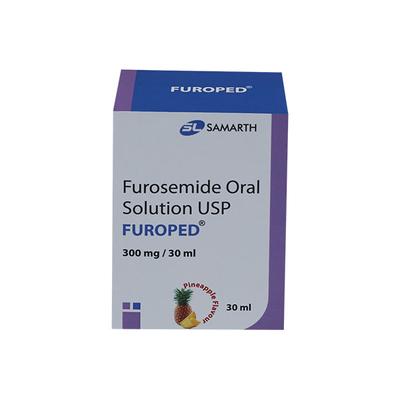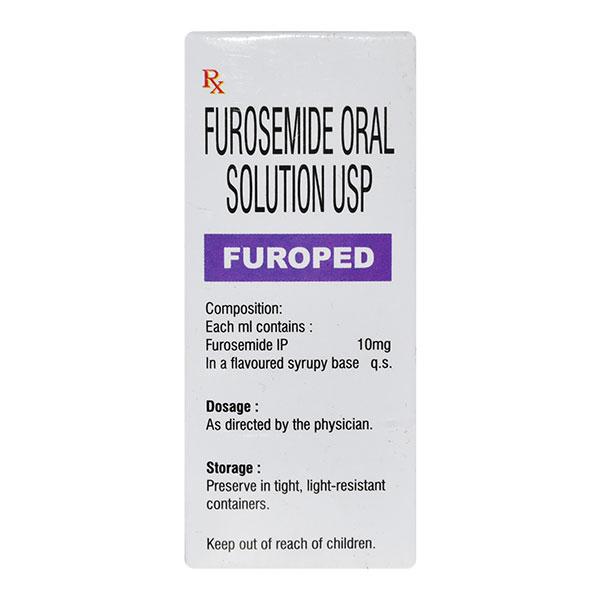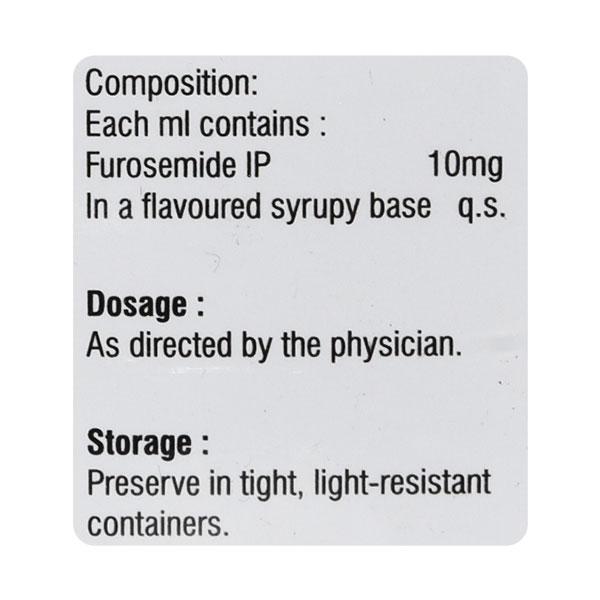

Netmeds First Membership
Quick Links
Introduction About FUROPED SOLUTION
FUROPED SOLUTION contains Furosemide which belongs to the group of medicines called Diuretics. FUROPED SOLUTION is used to remove excess water from the body due to lung, kidney, heart, liver and/or blood vessel problems. Oedema is a condition that occurs due to the accumulation of fluid in the body and is generally characterized by symptoms such as swelling or pain in the arms or legs and/or in affected joints, an increase in the size and puffiness of the tissue under the skin, etc.
FUROPED SOLUTION is not recommended for use in patients with low blood volume, an inability to pass urine, liver problems (such as severe liver failure) and/or kidney problems (such as kidney failure). Before taking FUROPED SOLUTION, inform your doctor if you have low blood pressure, porphyria, fits or seizures, a brain injury or brain disease, gout and/or diabetes.
FUROPED SOLUTION should be used with caution during pregnancy. It is not recommended for use in breastfeeding women, children or adolescents (below 18 years of age). The most common side effects of taking FUROPED SOLUTION are dehydration, excessive loss of body fluids, signs of sodium deficiency (such as cramps in the calf muscle, loss of appetite and weakness) and signs of potassium deficiency (such as muscular weakness and/or paralysis). Consult your doctor if any of these symptoms get worse.
Uses Of FUROPED SOLUTION
- Manage fluid retention in the body
How FUROPED SOLUTION Works
FUROPED SOLUTION works by blocking tubular reabsorption of sodium & chloride in kidneys and promotes diuresis (increased production of urine) which results in increased excretion of water along with magnesium, calcium, hydrogen, sodium and chloride thus removing excess fluid from the body and thereby providing relief from oedema in affected individuals.
How to use FUROPED SOLUTION
Take FUROPED SOLUTION as advised by your physician. Shake well before use. Your doctor will decide the correct dose and duration for you depending on your age, body weight and disease condition.
Side Effects Of FUROPED SOLUTION
Common
- signs of dehydration such as muscle spasms, weakness, twitching or convulsions
- signs of excessive loss of body fluids such as thirst, headache, confusion, muscle cramps, increased irritability of the muscles, muscular weakness, heart rhythm disturbances and gastrointestinal problems (such as a sensation of unease & discomfort in the stomach)
- signs of sodium deficiency (low sodium level in the body) such as cramps in the calf muscle, loss of appetite, listlessness, feeling of weakness, dizziness, drowsiness, confusion
- signs of potassium deficiency (low potassium level in the body) such as muscular weakness, paralysis, increased frequent urination and/or heart problems
- signs of severe potassium deficiency (very low potassium level in the body) such as an impaired function of the intestines, confusion and/or coma
Uncommon
- signs of abnormal blood count such as bruising and/or a tendency to bleed
- sensitivity to light
- involuntary leakage of urine
- blood clots (due to low blood volume, fluid depletion and thickening of the blood) in elders
- reversible/irreversible deafness
- disturbed eyesight
- signs of gastrointestinal problems such as diarrhoea/constipation
- tiredness
- weakness
- muscle cramps
- change in the ability to tolerate sugars
Rare
- signs of white blood cell deficiency such as increased susceptibility to infection
- signs of increased eosinophilic cells in the blood such as fever, weight loss, night sweats
- crawling, itching or tingling sensation on the skin
- life-threatening form of unconsciousness
- temporary hearing disorders & ringing in the ears
- inflammation of a blood vessel
- signs of acute kidney failure such as decreased urine output, tiredness, nausea, weakness
- signs of inflammation of the kidney such as blood in the urine, fever, pain in the sides
- shock (due to allergy)
- signs of skin reactions with red rashes/spots, itching, blisters
- fever
- general feeling of discomfort, illness
- minor mental disturbances
Stop using FUROPED SOLUTION and contact your doctor immediately if you:
- signs of allergic reactions such as skin rash, difficulty in breathing, fever and collapse
- signs of long-term allergic reactions include swelling of kidneys and blood vessels and sensitivity to sunlight
How To Manage Side Effects
Dehydration:
Take sufficient fluids to keep yourself hydrated. Consult your doctor if the symptom does not improve.
Warning & Precautions
Pregnancy
FUROPED SOLUTION should be used with caution during pregnancy and by women planning for pregnancy. Consult your doctor before taking the medicine.
Breastfeeding
FUROPED SOLUTION is not recommended for use by breastfeeding women. Consult your doctor before taking the medicine.
Driving and Using Machines
Do not drive or operate any machines if you feel less alert than normal after using FUROPED SOLUTION.
Alcohol
FUROPED SOLUTION should be used with caution in alcoholic individuals, only if recommended by your doctor as it may harm or worsen your condition. Consult your doctor before taking the medicine.
Kidney
FUROPED SOLUTION is not recommended for use in patients with liver problems such as severe liver failure. Consult your doctor before taking the medicine.
Liver
FUROPED SOLUTION is not recommended for use in patients with kidney problems such as kidney failure or hepatorenal syndrome. Consult your doctor before taking the medicine.
Allergy
Do not take FUROPED SOLUTION if you are allergic to Furosemide, sulphonamides or any of the other ingredients in this medicine.
Others
FUROPED SOLUTION is not recommended for use if you:
- have signs of low water level in the body such as weakness, difficulty in breathing and light-headedness
- are dehydrated
- have signs of low blood volume such as pale skin, feeling dizzy, faint/nauseous and/or feeling very thirsty
- are unable to pass urine or pass very little urine
- have signs of very low potassium/sodium levels in the blood such as muscle cramps, weakness and tiredness
- suffer from coma
Before using FUROPED SOLUTION, inform your doctor if you:
- have signs of low blood pressure such as dizziness, feeling less alert than usual fainting and general weakness
- have difficulty passing urine especially due to an enlarged prostate gland
- have gout
- have signs of low potassium level in the blood such as swelling, nausea/vomiting, diarrhoea and/or stomach pain
- have brain disorders (affecting your nervous system) or porphyria (blood disorder) associated with symptoms such as skin blisters, pain in and around the stomach area
- have diabetes
Use in Pediatrics:
FUROPED SOLUTION is not recommended for use in children and adolescents (below 18 years). Consult your doctor before taking the medicine.
Use in Geriatrics:
FUROPED SOLUTION should be used with caution in elderly patients (aged above 65 years) especially those who suffer from dementia. Consult your doctor taking the medicine.
Interactions
A. Drug-Drug interactions:
Before receiving FUROPED SOLUTION, your doctor if you are taking any of the following medicine:
- medicines used to manage high blood pressure such as angiotensin-converting enzyme (ACE) inhibitors (Ex. benazepril, captopril), angiotensin-II receptor antagonists (azilsartan, losartan), diuretics (Ex. acetazolamide, metolazone)
- medicines used to manage high blood pressure/prostate problems such as beta-blockers (Ex. prazosin)
- medicines used to manage high blood pressure, angina and heart failure such as beta-blockers (Ex. propranolol, atenolol, sotalol)
- digoxin (used to manage heart failure and unusual heart rhythms)
- medicines used to manage unusual heartbeats (Ex. amiodarone, disopyramide, flecainide, lidocaine, mexiletine)
- warfarin (medicine used to manage atrial fibrillation, blood clotting and stroke)
- clofibrate (used to manage high cholesterol)
- medicines used to manage pain and inflammation such as non-steroidal anti-inflammatory drugs (Ex. indomethacin), salicylates (Ex. aspirin)
- medicines used to manage inflammation such as corticosteroids (Ex. prednisolone, dexamethasone)
- lymecycline, ceftriaxone, vancomycin, gentamicin, colistin (medicines used to manage infections caused by bacteria)
- medicines used to manage infections caused by a fungus (Ex. amphotericin)
- nelfinavir, ritonavir and saquinavir (medicines used to manage infections caused by a virus)
- medicines used to manage organ rejection after transplantation (Ex. tacrolimus, ciclosporin)
- reboxetine, amitriptyline, phenelzine (medicines used to manage depression)
- risperidone, amisulpride, sertindole, pimozide, chlorpromazine (medicines used to manage mental health problems)
- lithium (used to manage extreme mood swings)
- atomoxetine (used to manage attention deficit hyperactivity disorder)
- carbamazepine, phenobarbital, phenytoin (used to manage epilepsy)
- salmeterol, salbutamol, theophylline (used to manage asthma and chronic obstructive pulmonary disease)
- ephedrine, xylometazoline (used to manage blocked noses)
- carbenoxolone (used to manage mouth ulcers and problems with the digestive area of the stomach)
- cisplatin, methotrexate (used to manage cancer)
- laxatives (used to manage constipation)
- probenecid (used to manage gout)
- potassium salts (used to manage low potassium)
- sucralfate (used to manage stomach ulcers)
- radiocontrast agents (medicines used as injections before x-ray examination)
Overdosage:
If you or anyone else accidentally receive too much of FUROPED SOLUTION, consult your doctor immediately or visit the nearby hospital.
Synopsis
| Drug | : | Frusemide |
| Pharmacological Category | : | Diuretics |
| Therapeutic Indication | : | Manages fluid retention in the body |
| Dosage Forms | : | Oral Solution, Tablet, Injection |
More Information
- Keep FUROPED SOLUTION out of reach from children
- Do not store the medicine above 25°C
FAQs About FUROPED SOLUTION
What happens if I take too much FUROPED SOLUTION?
If you or anyone else accidentally consumes too much FUROPED SOLUTION, consult your doctor immediately or go to a nearby hospital to manage overdose symptoms.
What are the common side effects of taking FUROPED SOLUTION?
The most common side effects of taking FUROPED SOLUTION are dehydration, excessive loss of body fluids, signs of sodium deficiency (such as cramps in the calf muscle, loss of appetite and weakness) and signs of potassium deficiency (such as muscular weakness and/or paralysis). Consult your doctor if any of these symptoms get worse.
Is FUROPED SOLUTION safe to be used by children?
FUROPED SOLUTION is not recommended for use in children and adolescents (aged below 18 years). If FUROPED SOLUTION is accidentally ingested by a child or adolescent, go to the hospital immediately and consult the doctor for further management.
Can FUROPED SOLUTION be used by pregnant and breastfeeding women?
Yes, FUROPED SOLUTION can be used in pregnant women, but with caution and it is not recommended to be used in breastfeeding women. Consult your doctor before taking the medicine.
How does FUROPED SOLUTION work?
FUROPED SOLUTION works by blocking tubular reabsorption of sodium and chloride in the kidneys and promoting diuresis (increased production of urine), which results in increased excretion of water along with magnesium, calcium, hydrogen, sodium and chloride, thus removing excess fluid from the body and thereby providing relief from oedema in affected individuals.
References
1. KD Tripathi. Diuretics. Essentials of medical pharmacology. Seventh edition. 2013 Page 579.
2. Tahir M. Khan; Roshan Patel; Abdul H. Siddiqui. Furosemide. NIH National Library of medicine. National Center for Biotechnology Information. [Revised in June 2022] [Accessed on 7th Sep 2022] https://www.ncbi.nlm.nih.gov/books/NBK499921/
3. Thame laboratories. Electronic Medicines Compendium (EMC). [Revised in December 2017] [Accessed on 7th Sep 2022] https://www.medicines.org.uk/emc/files/pil.2460.pdf
Useful Diagnostic Tests
- Kidney Function Test












